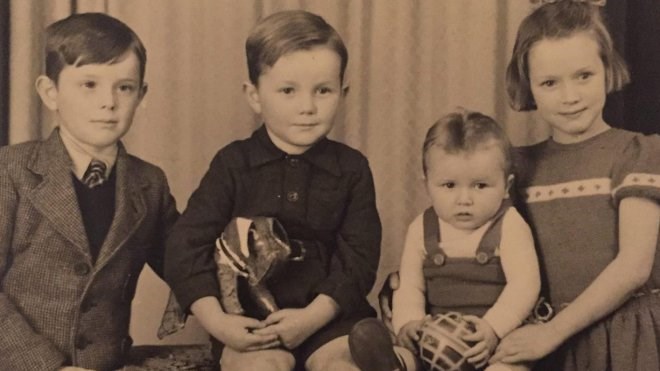Once again, I could hear my mother crying in the night. I jammed the pillow over my head to drown out that awful sound. My own tears kept falling as well. Loneliness, isolation, fear — these are common feelings of an immigrant on a ship taking us to an unknown land.
I was only 10 years old, but I remember it clearly. We had boarded the huge ship De Volendam in Rotterdam on Oct. 2, 1951. The wrenching goodbyes to grandparents, aunts, uncles, cousins and friends, our home and language, were painful. However, my two brothers and I were very excited walking up the gangplank amid 1,500 other immigrants all leaving Holland for Canada.
One morning, a voice on the public address system advised us to look to the right of the ship, and our gazes were met by the breath-taking panorama of enormous icebergs rising from the sea. We shivered in the cold, and the bright sun made them sparkle as though encrusted with crystals. On another day, incredibly, we observed whales seemingly dancing in the waves.
Unfortunately, sea sickness made the journey more difficult. This, coupled with the fact that our family had been separated upon boarding, made us feel uneasy. Dad and two of my brothers, Ronald and Willy, were sleeping in the large, dark hold, and mom and I and my three-year-old brother, Franky, shared a tiny, stuffy cabin. Bunk beds and a small toilet and sink were all the furnishings it contained. One day I left the cabin to get some fresh air and to play with my brothers on deck. Upon my return, I discovered the new book I was reading had been stolen.
It was the only book I was allowed to bring in my little red suitcase. I had placed it under my pillow and couldn’t believe that anyone could be so mean. I was devastated. Mom promised to buy me a new one as soon as we were settled in our new home.
We arrived in Quebec City on a glorious, fall day, Oct. 11. We had been sailing for nine days. After going through innumerable immigration checks, we were taken to a train station, and on the train we tasted Pepsi-Cola for the first time. I did not like it.
We arrived in Warren two days later, tired but happy that our trip was over and anxious to see our new home. Dad’s employer, a dairy farmer named Mr. Spaull, was to meet us, but he was not at the station.
Each time a man entered the station, Dad would show him our papers to ask if he was Mr. Spaull. Finally, a tall man entered and conveyed to us that he had been sent to pick us up and that he was Mr. Spaull’s brother-in-law.
Unbelievably, we had to ride in the back of his pick-up truck to our new home. That new home was a major disappointment. We were dismayed to realize that we would be sharing this two-storey house with an unknown Dutch family, also with four children – the Neelemans.
Just imagine — four adults and eight children under 10 years old sharing one three-bedroom house. Extreme loneliness and feelings of disconnection were constants.
Another Dutch family, the Terpstras, had already been in Canada for two years, and so were fairly fluent in the English language. We learned a lot from them. Miss Seguin found us to be ahead of her students in mechanical math. It was imperative we focus on learning English before we could advance in our other studies. Whenever she had any free time, Miss Seguin would teach us words by having us do the actions.
“Turn, Erna”, she would say. We also learned on the playground from the other pupils. We children learned the language quickly, and this was helpful for our parents. Dad was learning rudimentary English at the farm where he was working. However, since most of the other men were immigrants from several different countries, actions often spoke louder than words, which led to hilarious misunderstandings.
It was most difficult for Mom at home with three-year-old Franky. She had little contact with the outside world, and she was extremely lonely. One day she needed bleach for our clothes and sent me to the store in town. I walked the half hour to the store worrying how I was going to find what she needed. I searched all around the store and finally a kind saleslady approached me and asked me what I needed. With words and actions, I managed to convey mom’s request.
As soon as she understood, she found it for me. I was so happy that I rushed home with the bleach. My parents were very proud of me. The beginnings in our new country were most challenging in many ways.
Erna de Burger-Fex is a writer and retired teacher.
Join Sudbury.com+
- Messages
- Post a Listing
- Your Listings
- Your Profile
- Your Subscriptions
- Your Likes
- Your Business
- Support Local News
- Payment History
Sudbury.com+ members
Already a +member?
Not a +member?
Sign up for a Sudbury.com+ account for instant access to upcoming contests, local offers, auctions and so much more.
